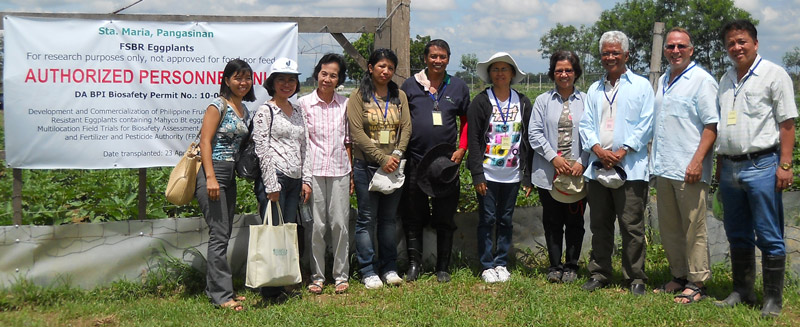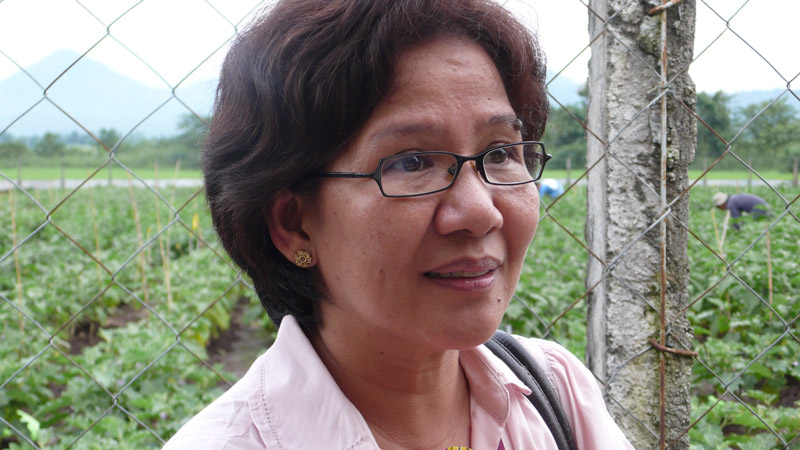The genetically modified eggplant known as ‘Bt brinjal’ provides dramatic control of its most serious insect pest in Asia and eliminates the need for insecticides, according to results just published by scientists in the prestigious open-access online journal PLoS ONE.

Field tests on this important vegetable were carried out by scientists based at the University of the Philippines Los Ba os between 2010 and 2012, comparing the effectiveness of plants carrying the Bt gene to conventional controls. The field testing site was located in the province of Pangasinan, the Philippines, to best represent vegetable-growing conditions in the country.
We measured the expression of the insecticidal Bt protein and counted the number of pests on each plant, concluding that the Bt eggplant conferred near-total control of the most serious pest of eggplant in Asia, the fruit and shoot borer (FSB) caterpillar, said Desiree Hautea, professor of plant breeding and crop biotechnology at the University of the Philippines at Los Ba os and the lead author on the paper.

Eggplant is one of the most important vegetable crops in the Philippines, but currently the only way to control FSB is by the use of broad-spectrum insecticides. Research has shown that farmers spray between 20-70 times over the growing season in the Philippines for control of FSB, said Anthony Shelton, Cornell University international professor of entomology and one of the authors on the paper. “With the pest control offered by Bt eggplant, these sprays can be eliminated.”
The insecticides used by vegetable farmers on eggplant include profenofos, triazophos, chlorpyrifos, cypermethrin, and malathion. Residues from their application have been found in both the soils of eggplant farms and in harvested fruits.
Farmers and farm workers have also complained of ailments such as skin irritation, redness of the eyes, muscle pains and headaches linked to exposure to these pesticides.
The results of the field trials show that Bt eggplant would not require any insecticide spraying against fruit and shoot borer since the Bt eggplant provides 95-100% control by itself. Despite this promise of environmental and health benefits, some activists groups have vociferously opposed the development.
In 2012 Greenpeace activists vandalised one of the Bt eggplant field trials at the University of the Philippines Los Ba os site, although scientists at the time said that the activists had ironically not destroyed the genetically modified plants but instead the protective biological barrier of non-GM pollen trap eggplants, which served as the required biosafety measure for the scientific trial.
Greenpeace and other anti-GMO groups also later won court action against the scientists, culminating in a Supreme Court judgement against Bt eggplant trials in 2015 that was roundly condemned by the scientific and farmer communities. However, by then the trials had been completed and data gathered by the scientists that has now been published following peer review.
The PLoS One paper is entitled Field Performance of Bt Eggplants (Solanum melongena L.) in the Philippines: Cry1Ac Expression and Control of the Eggplant Fruit and Shoot Borer (Leucinodes orbonalis Guen e)”. It is available free online for readers to download.
Bt controversy
Bt eggplant, known as Bt talong in the Philippines, Bt brinjal in India and Bt begun in Bangladesh, has been subject to political controversy elsewhere in Asia. Although approved by India’s biosafety authority, a moratorium was imposed by the then minister of environment Jairam Ramesh in 2010 after vociferous protests by anti-GMO activists. It remains in de-facto force today, causing farmers to spray frequently with toxic insecticides in an attempt to control FSB.
In Bangladesh, Bt eggplant has been developed by the Bangladesh Agricultural Research Institute (BARI) and released to the farmers by the government in 2014. Farmers have reported good harvests and dramatic reductions in their use of insecticide sprays. Last season, 108 farmers cultivated Bt eggplant in Bangladesh, with hundreds more growing the crop during the current season as farmers share and exchange seeds.
The Bt gene produces a protein that is harmless to humans but causes caterpillars to cease feeding. Bt is widely deployed in the world’s corn and cotton crops, grown across more than 80 million hectares in 2015 in 28 countries, predominantly by resource-poor farmers. Bt corn is an especially important crop in the Philippines, and all Bt crops have led to dramatic observed reductions in insecticide use. Organic growers use the same Bt protein as a spray but it is far more effective and just as safe when produced by the plant.
Despite claims to the contrary by some anti-GMO campaigners, there is international scientific consensus that food from crops developed via genetic engineering are as safe as food from conventional crops. The US National Academy of Sciences recently reinforced this consensus on the safety of genetic engineering in a landmark new report.
